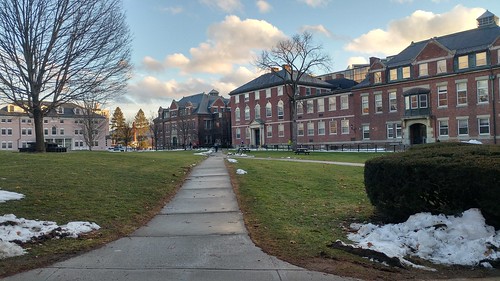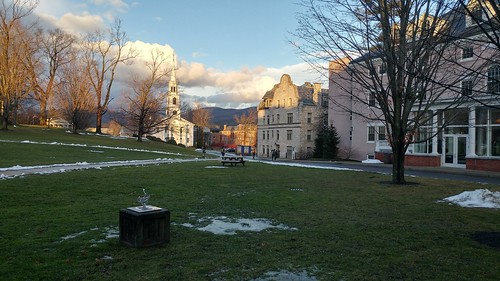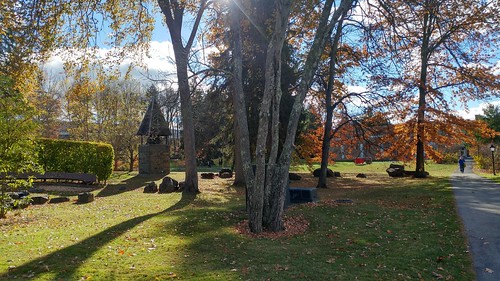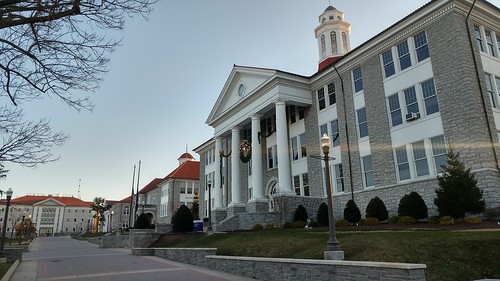Wednesday, March 8, 2017

Until I took a faculty jobs workshop last September, the term "liberal arts college" had never really entered my thoughts. Reading through example application materials during the workshop, I identified most with the applicants to liberal arts colleges, just like I had subconsciously been drawn to teaching and educational research the bulk of my academic career. And so it became clear quite quickly that I should apply to liberal arts colleges. The application preparation process actually clarified what I should do with my life.
The elevator pitch I generally gave during my interviews revolved around a couple key points (brevity is very important):
- I was always drawn to teaching experiences. My research spends much time looking at learning largely due to this, but I have also spent significant time outside of research on improving my teaching in X, Y, Z ways.
- My research specialty is particularly well-suited to institutions that prioritize interdisciplinary work that incorporates diverse perspectives from the students as well as the surrounding community. This specialty has a particular emphasis on including multiple perspectives and critical thinking that are particularly instrumental for developing citizens of the world.
- Frequent references to concepts from my teaching statement, because I live and breathe that document on the regular.
- (Occasionally) I believe I haven't been in an environment that properly prioritizes student learning in line with my values, and I want the space to be able to grow as an instructor. I believe a liberal arts college will do this.
- If I had ever attended a liberal arts college, this would be another great point to mention briefly. But alas...
This was really the extent of my reflection during the applying process. Writing my liberal arts college materials came a little easier to me, and it was not going to hurt me to submit 12 liberal arts college applications. The campus visits further solidified this feeling of goal alignment with a liberal education. The institution with which I had the best chemistry was also a liberal arts college, and so that was the direction I chose. I am so incredibly, overwhelmingly excited about where I'm headed right now.
Like any major life decision, you make the best choice you can given the information you have at the time. The trickier bit here is that you have some control over how much information you have, but some is kismet. Had I not encountered others' liberal arts application materials during that jobs workshop, I may have remained ignorant to the potential of the path I eventually chose. This appears to be a fairly common affliction, as its echoed in this post by another junior faculty at a liberal arts college.

What is a SLAC?
Just like with research institutions there is a range of endowments, supports, expectations, and quality of Primarily Undergraduate Institutions. If you have degrees from highly competitive research-oriented academic institutions, you may wish to focus your efforts on the more selective of the bunch of liberal arts colleges, or Selective Liberal Arts Colleges (SLACs). You can find lists of these online, and investigate them that way, but I tend to think most schools with less than 5 courses/year teaching load and no graduate students will fall generally under the title of SLAC.Just because liberal arts colleges do not have graduate students, does not mean there are no research expectations in the tenure process. This is especially false for SLACs. The lighter the teaching load, the higher the research expectations. But perhaps, instead of being expected to publish ~4 peer-reviewed papers per year and bring in $X grant dollars, you might only be expected to publish ?twice? per year and bring in $X/8 grant dollars. Or less, who knows! None of these expectations are ever explicit enough. That being said, doing research at a low course-load SLAC may be somewhat comparable to being a postdoctoral researcher. But we shall see.
SLACs want you and your competitive degree.
I recall being told at a grad student party that "teaching schools don't want professors from top tier research schools"; the explanation being that teaching institutions generally did not trust that these research PhDs would want to stay long term at a teaching college. This is pretty much the opposite of the truth, at least for moderate to high achieving teaching institutions. The SLACs want graduates of {Stanford, MIT, U-Dub, CMU, the Ivy Leagues, and other places as well}. They will interview you, you just need to convince them that you thoroughly enjoy teaching and have always pursued pedagogical opportunities.For the most part, this means that any academic institution with less than 6 courses/year teaching load will not scoff at an application from research-oriented alum. You will, however, have to explain in your cover letter, quite explicitly, why you are drawn to promoting a liberal education. If you have sought teaching opportunities beyond simple teaching assistantships, such as instructing/designing your own full course at your home institution or a neighboring teaching-oriented institution (!!!), you are likely to do well. If not, you will need to do a little narrative yoga to make a convincing argument as to why you are not just qualified to teach, but intrinsically motivated to do so and have been making strides toward that goal.
There do, however, exist some teaching-oriented schools that are suspicious of applicants with overly ambitious research histories. Not knowing my worth on the job market, I applied to one of these institutions and received a response challenging my desire to work at that locale. But with a little digging I discovered that the teaching load at this institution was 6 courses per year, and so I learned my lesson.
Apply generously beyond your word-of-mouth bubble.
Also, do not limit your applications to only places you have heard of. You will be severely limiting yourself, unnecessarily so. Start with lists of top-ranked liberal arts colleges or moderate-ranked research institutions. Not all state schools have the state's name in their title! Having never attended a liberal arts college, I do not think I had previously heard of most of the SLACs I ended up applying to. But I started with an Internet list, and checked each school's department to see if they were hiring, working my way down the entire list. And then I did other goofy things, like read Lin Manuel Miranda's Wikipedia page, and discovered that he attended Wesleyan University, and applied to their department that was hiring. There was also the quite sensible name-blind application criteria that I used for aggregated lists of faculty jobs, to ensure I didn't limit myself to the well known to me.There are many paths to discovering schools that can be a fantastic fit. Please don't limit yourself to only the familiar.

Breaking the Liberal Arts path to your research advisors.
If your academic background is at research institutions, it's quite possible your typical mentors and advisors may think you're from an alien planet for wanting to go to a liberal arts college. My postdoc mentor was incredibly open to the idea, and wrote me a separate, generalized liberal arts college letter of recommendation, but I don't think this should be the expected response. For example, this paraphrased email conversation with my PhD advisor:| Me: ...I have job offers from these three schools. E University was interesting, but I didn't like the fit. A University could be a potentially good fit, although they have no research expectations. And I really liked A College, they might be top of my list... PhD Advisor: ...I think E University is the best fit for you... |
If you're super uncomfortable with convincing these very-important-to-your-career people of your desire to apply/end-up at a liberal arts college, you can always use the general letter of recommendation you obtained via Interfolio. But if you get liberal arts college offers, you're going to have to break it to your letter writers at some point. 'Just be prepared for the above conversation snippet, or potential isomorphic situations.
The only person who gets to make decisions about the best way to achieve your goals is you.
Diversity Concerns
Should you select a private liberal arts college, you may get a bit of guff and gentle teasing about how your selection is a "school for rich kids". And I think for many liberal arts colleges, this is not terribly far off from the truth. Thankfully, there's actual data out there to help you better understand each institution's economic and ethnic diversity.- NYTimes Interactive Report on 'Some Colleges Have More Students From the Top 1 Percent Than the Bottom 60' [Income]: From this interactive report, you can see what percentage of a school's student body is from the economic top 1% versus the bottom 60%, and some rankings on upward mobility. Most notably, 38 colleges had more students from the top 1% than the bottom 60%, and 8 of the top 10 worst offenders are liberal arts colleges (Colorado College, Washington & Lee University, Trinity College, Bucknell, Colgate University, Kenyon College, and Middlebury College). As a bit of a comparison, you can check out where Williams College, Amherst College, Smith College, and Oberlin College fall in that ranking. You may also notice that most state universities tend to have way more bottom 60% students than top 1%.
- More on economic diversity: 'Top Colleges Doing the Most for the American Dream' - Amherst, Pomona, Vassar, Williams, Wellesley, Knox, and Barnard all end up in the top 20 of colleges providing access to students of varying socioeconomic status.
- Hechinger Report on 'How do they do it? A few wealthy private colleges have found ways to serve many needy students without jeopardizing their financial health': This article looks at four liberal arts colleges (Denison, Grinnell, USC, Williams) in an interview about how they serve students on Pell Grants (i.e., family income less than $40,000).
- Forbes' 'Diversity At Top Colleges: Here's The Proof': The visualization at the bottom of this article shows the ethnicity break down for a considerable number of top-ranked schools from the 2014-2015 academic calendar.
- I've got nothing in aggregate for gender diversity, but that might be best done on a department-by-department basis.
In short, some liberal arts colleges actively recruit for diversity while others are considerably less successful/dedicated.

Specific things to prepare for teaching in higher education.
- Pursue many opportunities to teach. Guest lectures. TAing recitations. Being the head instructor for a course (bonus points). Weekend workshops for local middle schoolers. Teaching a community college or other external course (super bonus points).
- Seek feedback on your teaching. Have a pedagogical expert sit in on a lecture and give you formally written feedback. Collect mid-semester course evaluations from students, so you can address concerns before it's too late.
- Earn that teaching certificate. Does your university offer a teaching certificate for grad students or postdocs? Or even a semester-long class on course design? Take it.
- Attend pedagogy courses that are useful/interesting for your goals. If your university doesn't offer a semester-long class on course design, consider online resources like the free CIRTL Evidenced-Based Teaching Online Courses. Similarly, attend any seminars, lectures, or workshops offered by your university's center for teaching excellence or school of education that you think could be useful. Keep reflections and "Big Ideas" from these sessions in a notebook, so you can refer to them later.
- Incorporate your new pedagogical knowledge into your teaching statement. A good teaching philosophy will likely include "evidence-based teaching" and "active learning" (alternatively, "learner-centered approach"); if you've already done the above recommended activities, you'll know why ;)
- Create a teaching portfolio. This should include your teaching philosophy statement, syllabi you've created for courses, formal evaluations from pedagogical experts of your teaching, early and final course evaluations from students, short videos of you teaching (or a video or two from a flipped class lecture you've done), main takeaways from any pedagogical courses you've taken, teaching aids you've designed that you particularly like, overview of any volunteer opportunities that involved mentoring or teaching, teaching certificates, etc. etc. Heavy on the photos, minimal on the words, if at all possible.
BYOV Posts on the Faculty Job Search
- Overview of the Assistant Professor Job Search
- Applying for Academic Positions
- Remote Interviews
- Packing for On-Campus Interviews
- On-Campus Interview Lessons Learned
- Sample Assistant Professor Job Hunt Timeline
- Reflections on Negotiation
- Descriptive Statistics of my Job Search
- Deciding Research or Liberal Arts






0 comments:
Post a Comment